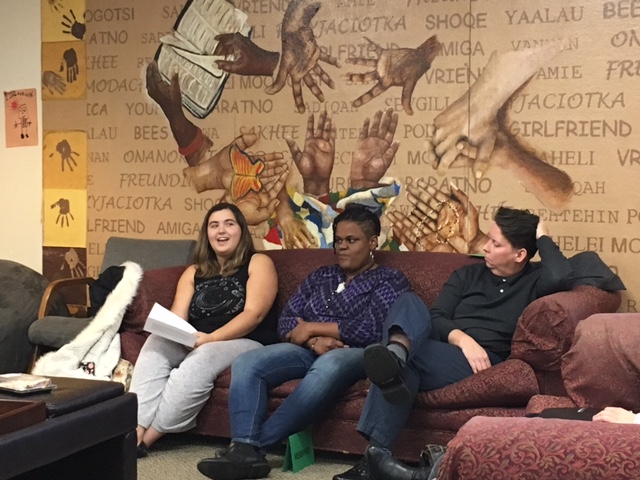Last week on Wednesday, November 8th, the Women’s Center held our final roundtable discussion of our fall series. The theme: Women in Writing. Panelists, moderator, and participants generated a fascinating discussion on the valuation of women as writers, artists, and creators in greater society. Although much of the criticism that was voiced made for a bleak outlook, our panelists passed on enlightening advice for all artists struggling to make a life with their work.
The roundtable began with the moderator (in this case, myself!) presenting some statistics to ground the conversation. Student staff members had done research to discover the representation of women as both content makers and content matter. Some highlights in these statistics include that women have made gains in more bylines from 2011 to 2014, but they still don’t make up even half of the men’s bylines; half of the National Book Award recipients from 2000 to 2014 have been by men and about men; and similarly, more than half of the Pulitzer Prize recipients from 2000 to 2015 have been by men and about men. In adding an intersectional lens to this data, we also find that women’s publications (when they actually happen) are dominated by white women–women of color, as you may have guessed, make up only a small fraction of the women published in both Poetry and The New Yorker. Check out VIDA for even more numbers on this topic.

These numbers stressed the need for this conversation, and our panelists delivered many times over. Tanya Olson (poet and faculty in the English Department), Missy Smith AKA QueenEarth (singer/songwriter and coordinator in the Women’s Center), and Johanna Alonso (writer and UMBC student) started strong in their introductions teasing out themes that we would continue unraveling throughout the panel discussion. Some of the major points from the discussion included:
- There is a double standard in today’s literary canon. Women are constantly reading about men and books by men, but men reading books about women/by women is not emphasized in the same way. Johanna brought up, for example, that despite the Hunger Games series popularity, many men in her life refused to read the books because the main character was female (and written by a woman).
- The wealthy heterosexual white male gatekeeper has the power to set mainstream agendas. Many of the panelists agreed that the mainstream art society was a typically masculine space defined by male gatekeepers. When we have those gatekeepers in the form of editors, publishers, producers, etc. they control the agenda, which more often than not does not place value with marginalized creators and their content.
- Despite the harsh landscape, progress is being made. Both Tanya and Missy spoke to the idea that there is plenty in the world that motivates them to continue what they do, and that comes in the form of the other folks like them–people of color, LGBTQ folks, etc.–who are being published, performing, and making careers for themselves. This visibility, to both Tanya and Missy, is crucial not only for them, but for all of the other writers and artists who aspire to grow in their fields. Missy specifically noted that she writes music and performs to empower others to do the same.
- You must value you yourself. In order to do this work, you must value yourself. You must continue to believe in your work and the process of honing your craft. This is the driving factor for all of our panelists. Sparked by a question in the crowd about the devaluation of spoken word poetry versus musicians as art, Missy brought up that you have to stick up for yourself. If, for example, you are the only poet in a lineup of musicians, you need to ask to get the same payout as the musicians, because your art is worth that much.
- The reality is that you are not alone. Although it can feel lonely and exhausting to be one of the only “different” people (women of color, LGBTQ people, immigrants, etc.) in your field, you are not alone. Tanya made this point and noted, as well, that even though it may feel isolating, there is a path for everyone–you just have to find it. For her, this meant finding the person who was one step ahead of her, and looking to them as a model and/or a mentor. Johanna noted that her ambivalence transitioned to enthusiasm in a writing class when she found that she was not the only person writing stories about queer people. Just so, when we find the people who make space for us, we need to take it and make more space for all those who follow.
This rich conversation made clear that although there are many barriers that make women writers and artists journeys more difficult, these also create the richness and depth in their stories. The struggle, in some ways, necessitates the story/song/play/etc. in our world, and that success in writing is the sustained progress we make as we take up space and demand equity in the valuation of our art.
In final words of advice, Johanna encouraged us to venture into the nether regions of the Twitter-verse for obscure literary magazines and to read from those sources. Finding art in the most un-obvious places is a way to constantly learn more. Tanya again noted that mentorship can be key, and to find the person who you want to be–and start there. Finally, Missy took us home: “Failure is stopping. We have to keep moving and focusing on the long-game. It’s okay to be different–in fact it’s better
Further reading: